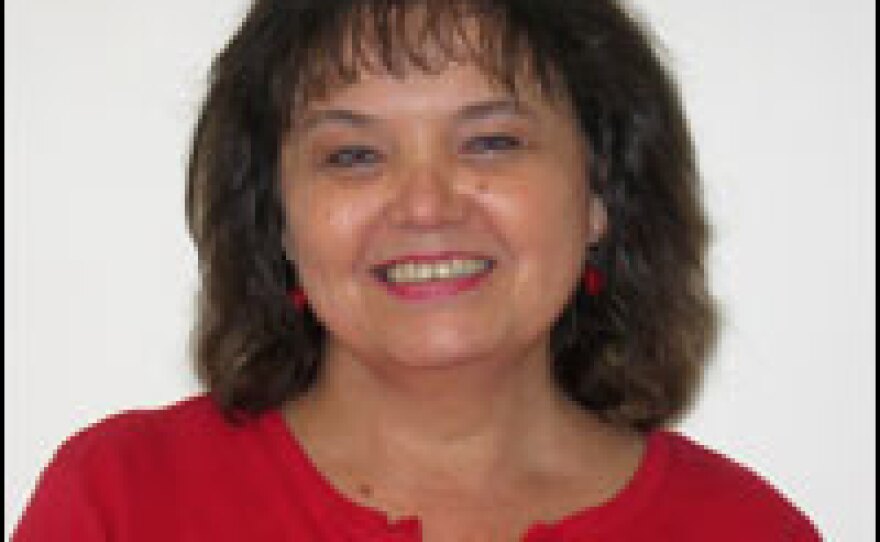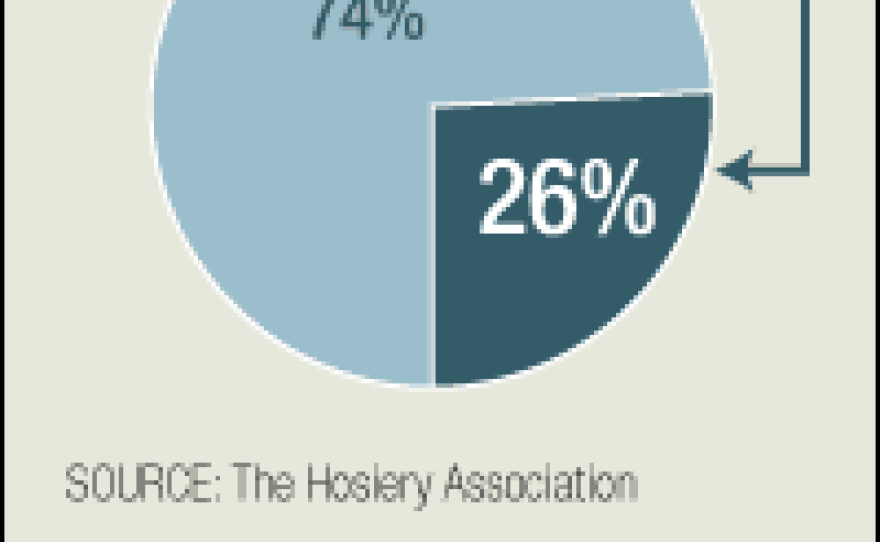

In the last five years, the sock industry has grown dramatically in Honduras. Sock making is now one of the small, poor Central American nation's fastest growing and most promising industries — and it might disappear soon.
The sock business blossomed in Honduras around a special duty-free provision granted by the U.S. government. But in the next few weeks, the U.S. is expected to rescind that special status.
Joheny Avila's Story
Joheny Avila has a dream. She's been working hard every day for the past two years on nothing else but fulfilling that dream. She wants to be the first woman sock-knitting machine technician in Honduras.
Avila says there are no other options for her. The brand new Honduran sock industry pays more than anything else. Socks are the only way she can improve her life.
Avila doesn't know that the big sock manufacturers might soon leave Honduras. Sock makers may move to other, cheaper countries if the U.S. government rescinds duty-free status for Honduran sock exports, which it is likely to do by mid-December.
But Avila doesn't know anything about U.S. tariff policy and its impact on her life, so she spends her days at Honduras' leading sock school.
Instituto Politecnico Centroamericano
Colin McLernon runs the grandly named Instituto Politecnico Centroamericano. It's a brand new high-tech center designed to solve a problem.
The U.S. gave duty-free status to Honduras just over 20 years ago. The idea was to stimulate an industrial revolution in this poor, agrarian country. It worked. Lots of foreign companies built factories to take advantage of easy access to the U.S. market.
They found that their workers, often the children of illiterate farmers, needed special training.
Instituto Politecnico Centroamericano is the first technical institute in Central America developed to train workers for the textile and apparel industries, and maintenance for all industries.
Most students are poor. McLernon says they also have to teach students how to dress, comb their hair and to bathe every day; running water is a luxury for many in Honduras and bathing often becomes less of a priority.
The sock industry has a strict policy: They won't hire anyone under 18. But students in the training school can be as young as 15. Classrooms are set up like mini-sock factories with real equipment.
Students also learn electronics, business ethics and English.
It's a lot to learn for someone like Avila, who has only a sixth-grade education. She is tiny – under 5 feet tall – and only 17. She's going to school, she says, so she can make enough money to help support her parents and her five younger brothers and sisters.
Starting to Build a Road
Avila's home is up the side of a mountain.
"The road here is very uneven," she says. "It has lots of holes. It's dangerous, too. Thieves hide around here."
Avila walks this ridiculously steep and pitted road every day, sometimes in the dark. Her family lives near the peak, in a concrete box with a rough metal roof on a little plot, with a few chickens and pigs wandering around.
"I built the house myself," says her father, Jose David. "When we came here 14 years ago, it was open fields. But people have moved in little by little. The city is starting to build a road."
Avila's parents came here from a farm to work in the new factories built just after the U.S. duty-free agreement. But, with a family of eight, they often ran out of food.
"After Joheny finished middle school, we were very, very short on money," Jose David says.. "We didn't have money for her lunch. She walked several miles to get there. It was hard. She had to quit school."
Joheny was worried. She thought she'd become one of those girls downtown selling used clothes, homemade food or who-knows-what-else for a few pennies an hour. Then she heard about the sock school. She took the entrance exam and did so well she got a scholarship and a stipend. She's been told that after she turns 18 next March, she can start work and make $600 a month.
Her father is thrilled.
"That salary would change everything for us," he says. "She could buy whatever she wants – things that we can't buy for her. We would be very, very happy with that salary."
World's Largest Sock Factory
Joheny wants to work at the massive sock plant in the Free Trade Zone, built by the Canadian apparel giant, Gildan. It is the largest sock factory ever built anywhere in the world.
"That's pretty impressive," says Frances Lynch, who runs the mill. "I'm very proud of it."
It's not just the world's largest sock factory, it's probably also the most technically advanced, filled with the latest in high-tech sock-making equipment.
And that is saying a lot for a factory that a year ago was nothing more than a half-finished concrete building. Now, there's a large knitting floor — the size of a football field — with thousands of knitting machines, each about the size of a dishwasher. And they're putting in more machines every day.
This is where Joheny will work, repairing the machines that break down.
That is, if the plant is still here.
Gildan built in Honduras — not in China or Bolivia — because of the duty-free access to the U.S. If the U.S. takes that away, Gildan strategists will have to recalculate. With a sudden increase in cost for Honduran exports, they might decide to make socks elsewhere.
"Common sense tells you we would take a look at it," Lynch says. "We'll do whatever is best for Gildan, whatever happens."
When you can build the biggest sock factory in the world in a few months, you can also take that factory away and move it somewhere else just as quickly. Gildan isn't talking, but many in the Honduran government are worried that if the U.S. does take away the duty-free status, this plant and the entire sock industry will just go away.
Copyright 2022 NPR. To see more, visit https://www.npr.org. 9(MDAzMjM2NDYzMDEyMzc1Njk5NjAxNzY3OQ001))







